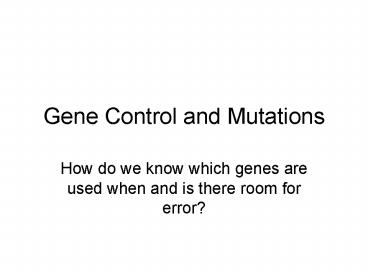Gene Control and Mutations - PowerPoint PPT Presentation
1 / 22
Title:
Gene Control and Mutations
Description:
Luciferase production in deep sea fish NEMO ... Mutated gene darker phenotype. Dominant gene (non mutated) Lighter phenotype. Mutated Fruit fly ... – PowerPoint PPT presentation
Number of Views:34
Avg rating:3.0/5.0
Title: Gene Control and Mutations
1
Gene Control and Mutations
- How do we know which genes are used when and is
there room for error?
2
Protein synthesis and beyond
- How does RNA polymerase know where to start
transcription? - -RNA Polymerase binds to Promoter region on DNA
(TATA box) ? signals start of Transcription - -Pre-mRNA is produced ? contains INTRONS and
EXONS - -Exons gene coding regions 2.4 cm/2 meters
- -Introns rest junk DNA!!!
3
RNA editing from pre-mRNA to mRNA
- Result functional gene with only regions coding
for protein, coding for trait - Only edited mRNA is Translated at ribosome
- Not the exact same as the DNA!!!
4
Gene Control
- Genes Transcribed only when needed
- Saves energy control
- Feedback molecules/signals will either cause
transcription of gene or block it - Luciferase production in deep sea fish NEMO
- Hormones bind to promoter ? transcribe luciferase
gene ? glowing
Luciferase protein
5
Promoter site of RNA Polymerase binding
6
Genetic Mutations -11.3
- Changes in DNA that also change the protein
produced - Can happen spontaneously (no reason they
occurred) - mistake - OR
- By mutagens substances or agents that can cause
changes in DNA increase w/age - Ex. Chemicals, radiation, x-rays, viruses,
smoking - Thymine dimer UV rays causing T to pair w/T
7
Mutations can affect org. or may notwhy?
- Mutations of DNA at promoter region or EXON
sequences of gene may lead to visible/harmful/heri
table mutations - May lead to over expression of gene
- Oncogenes, p53 ? cancer
- Mutations in INTRON areas of DNA will not be seen
in the organismwhy? - What is the purpose of Intron sequences?
8
Mutations in reproductive cellsvs. Mutations in
body cells
- Changes in reproductive cells
- code is changed in sperm or egg (Meiosis)
- wont effect the parent, but CAN effect the
offspring produced from those altered sex cells - can be POSITIVE new, adaptive traits
- Most of the time fatal or harmful!
9
Mutations in conception or meiosis Hereditary
Mutations
10
Somatic Mutations
- Changes in body cells
- not passed on to offspring, but can cause
MAJOR complications for the individual effected - Ex. Solar radiation skin cancer
- again process is thought to be cumulative
effect of exposure to mutagens over time
11
Somatic Cell Mutations only affect that organism
12
Point mutations vs. Chromosome mutations
- Point Mutation change in single base pair of
DNA or just a few base pairs - Chromosome mutation change in a large portion
of an entire chromosome effects MANY genes - Which one could be more harmful?
13
Point/Gene mutations
- Change in 1-2 base pairs of DNA 2 types
- if does not effect the length of the code,
will just change the amino acid in that position
1. SUBSTITUTION - Ex A to G
- if changes the length of the code, is called a
2. frameshift mutation, and are two types of
these - INSERTIONS AND DELETIONS
14
Point/Gene Mutations affect only ONE base in the
codeSubstitutions, Insertions, and Deletions
Section 12-4
Deletion
Substitution
Insertion
Gene Mutations only affect ONE point of the code
-- often called Point Mutations
Go to Section
15
Example Problem
- Normal gene TACGGTAATACT
- mRNA?
- aa sequence?
- of aas in protein
- Mutated gene TACGTAATACT
- mRNA?
- aa sequence?
- of aas in protein
- What type of mutation is this?
16
Chromosome mutationsEffect Chromo numbers and
Chromo shape
- 1. Mistakes in numbers of chromosomes
- -nondisjunction what is this?
- -Trisomy or Monosomy or Polyploidy
- 2. Mistakes in shape of chromos
- a. deletion part of chromo is broken off and
lost completely - b. duplication broken fragment of chromo
attaches to sister chromatid so section is
repeated on that chromatid - c. inversion when fragment reattaches to
original chromo but in reverse order - d. translocation broken fragment attaches to
a nonhomologous chromo - (can exist as reciprocal or nonreciprocal)
17
Chromosomal Mutations affects LARGE portions
of the code (entire genes or entire chromosomes)
Section 12-4
Deletion
Duplication
Inversion
Translocation
Go to Section
18
Trisomy 21 Down SyndromeKaryotype
19
Trisomy 16 cause of most miscarriages in first
trimester of pregnancy
20
Benefits of Mutations
- -MOST mutations are either unnoticed or harmful!
- -Some add new phenotypes ? adaptive advantages
(evolution)the moth - -Some mutations tell us what a gene (DNA
sequence) codes for can detect only when
sequence is changed (compare)
21
Moth Evolution in Industrialized England
- Many not all recessive phenotypes may have
began as mutation of normal gene
Dominant gene (non mutated) ? Lighter phenotype
Mutated gene ? darker phenotype
22
Mutated Fruit fly































